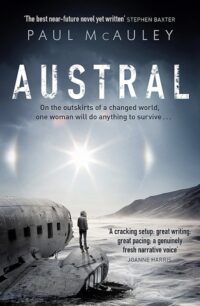Book review: Austral by Paul McAuley
 Paul McAuley is Tim’s favourite author and I completely understand why. I am surprised McAuley isn’t more widely known, as he is in my experience consistently excellent, creating thoughtful, hard science fiction with great characters and exciting stories.
Paul McAuley is Tim’s favourite author and I completely understand why. I am surprised McAuley isn’t more widely known, as he is in my experience consistently excellent, creating thoughtful, hard science fiction with great characters and exciting stories.
His 2017 novel Austral imagines a world where the climate catastrophe has happened, the worst-case scenarios came to pass, and the surviving humans have learned little to nothing from it, continuing to put the needs of rich people and corporations before other concerns. It’s depressing in its believability.
A century after the climate catastrophe, Antarctica is now a country with elected politicians and cities to house all the people who work in the plethora of mines the continent is now home to. The first wave of people to move to Antarctica, decades before our story begins, were the Eco Poets, a collective who planted forests, gardens and small farms. But they were targeted as political “undesirables” and now their legacy is the scattered remains of their plantations, and the children they created through gene editing to be better adapted to the Antarctic climate, known as “huskies”.
Our heroine, Austral, is a husky. She’s large, strong and fat so that she doesn’t feel the cold. Discriminated against wherever she goes, she has limited employment options and few friends. Austral works as a prison guard at a penal colony, a rare job that she is well suited for. She dreams of living in an apartment in Auckland, an ordinary life somewhere safe – a dream that is simple and impossible.
When her prisoner boyfriend asks Austral for a favour that goes wrong, she finds herself on the run, trying to survive everything people and nature throw at her. It’s a thrilling race against the law, gangsters and survivalists.
“Even the fiercest blizzards were only a mild inconvenience in the city, but out in the back country you were hostage to something raw and elemental, inhumanly huge and indifferent. The blizzard wouldn’t care or notice if it killed me, and realising that, submitting to it, was dismaying, thrilling liberating.”
Austral is accompanied on this journey by her 14-year-old cousin Kamilah, who she tried to save from being kidnapped but has somehow become her hostage instead. Their attempts to get to know and understand each other form the heart of the novel, giving McAuley the opportunity to explore themes of racial and economic inequality; how stories are twisted and corrupted to suit the needs of the teller; and his fictional history of how the climate crisis unfolded (which is based on very real scientific data and projections).
At first, Kamilah is a spoiled rich brat and Austral is a recalcitrant, brutish kidnapper ill-suited to caring for a teenager. But they learn that to survive they must rely on, even trust, each other. Through their conversations, they both become more interesting, nuanced characters.
McAuley has clearly read the classic tales of polar exploration – Shackleton, Scott, Amundsen, Rasmussen et al. – and his narrative at times has the feel of Apsley Cherry-Garrard’s The Worst Journey in the World. McAuley is also influenced by his own training in biology and botany, giving a lot of detail about the Antarctic flora and the work of the Eco Poets.
“Mama had taught me all about the unfairness of the world. It isn’t just that the rich have more money than us. It’s all the rest. All the social privilege that so-called ordinary people lack. The life chances that privilege opens up. The sense of belonging, of being part of a storied lineage. The rich know exactly where they come from, who they are. The rest of us inherit only fragments of lives memorialised in hand-me-down stories whose details are exaggerated and altered with every telling, or glimpsed in corrupted files from dead media.”
Looking at this novel as a potential future vision (which I know we’re not meant to do with science fiction set in the future but it’s hard not to with such a clear theme of climate catastrophe), the tale of the Eco Poets is the one ray of light. They tried to find ways to make this newly available land not barely survivable, but instead thriving with life. I have to hope that will exist as well as the rapacious corporations and corrupt politicians.
Austral is both a thrilling adventure and a terrifying depiction of how one of Earth’s most beautiful places might end up if we fail to combat the climate crisis but continue to put selfish immediate needs first.
Published 2017 by Gollancz.
One Comments
Comments are closed.